54. SQE for Foreign Lawyers: Navigating the Qualification Process
Are you a foreign lawyer aspiring to practice law in the UK? The Solicitors Qualifying Examination (SQE) is the new route to qualification for aspiring solicitors, and understanding the process as a foreign lawyer can be overwhelming. In this comprehensive guide, we will navigate through the SQE qualification process specifically tailored for foreign lawyers, helping you understand the requirements and steps involved in achieving your goal of becoming a solicitor in the UK.
The SQE: An Overview
The SQE is a two-part examination introduced by the Solicitors Regulation Authority (SRA) to assess the knowledge and skills necessary to qualify as a solicitor in England and Wales. It is designed to provide a more flexible and accessible route to qualification.
The qualification process involves passing both SQE 1 and SQE 2. SQE 1 is a multiple-choice exam testing your functioning legal knowledge, while SQE 2 focuses on practical legal skills. As a foreign lawyer, it is crucial to understand the additional requirements you may need to meet to qualify.
Eligibility Criteria for Foreign Lawyers
If you are a qualified lawyer from a jurisdiction outside of England and Wales, you can still pursue qualification as a solicitor through the SQE pathway. However, there are a few additional eligibility criteria you must meet:
- You must have a recognized law degree or a degree in another discipline and have completed the Graduate Diploma in Law (GDL) conversion course.
- You must have a Certificate of Eligibility (CoE) from the SRA, which confirms that you are eligible to take the SQE exams.
- You must meet the English language requirements set by the SRA. This usually involves providing evidence of proficiency in English, such as a passing score on an approved English language test.
Once you have met these criteria, you can proceed with the SQE qualification process.
The SQE Qualification Process
The SQE qualification process consists of several steps that you need to follow as a foreign lawyer. Let’s break it down:
Step 1: Assessment of Eligibility
Before applying for the SQE exams, you must ensure that you meet all the eligibility requirements mentioned above. This includes having a recognized law degree or completing the GDL conversion course, obtaining a CoE from the SRA, and meeting the English language requirements.
Step 2: Preparation for SQE 1
Once you have been deemed eligible, it’s time to prepare for the SQE 1 exam. This part of the examination assesses your knowledge of the core legal subjects. As a foreign lawyer, you may need to familiarize yourself with the specific laws and legal systems of England and Wales that may differ from your home jurisdiction.
To effectively prepare for SQE 1, consider enrolling in a reputable SQE preparation course. These courses are designed to equip you with the necessary knowledge and skills to pass the exam.
Step 3: SQE 1 Exam
The SQE 1 exam is a computer-based, multiple-choice exam. It tests your understanding of the core legal subjects, such as contract law, criminal law, property law, and more. The exam is divided into two parts: functioning legal knowledge (FLK) and practical legal skills (PLS).
Make sure to familiarize yourself with the exam format, time limits, and grading criteria. Practicing with past papers and mock exams can greatly enhance your chances of success. Remember to pace yourself during the exam, as time management is crucial.
Step 4: Practical Experience
After successfully passing SQE 1, you will need to gain at least two years of qualifying work experience (QWE) to become a fully qualified solicitor. This experience can be gained in England and Wales or through Recognised Overseas Professional Qualifications (ROPQ).
During this period, you will have the opportunity to apply your legal knowledge in a practical work environment under the supervision of a solicitor. This experience is essential for developing the necessary skills and competencies required of a solicitor.
Step 5: Preparation for SQE 2
While gaining practical experience, it’s important to simultaneously prepare for the SQE 2 exam. This part of the examination focuses on practical legal skills, including client interviewing, advocacy, and legal drafting.
Consider enrolling in practical skills training courses or seeking guidance from experienced solicitors to refine your practical skills and prepare for the exam effectively.
Step 6: SQE 2 Exam
The SQE 2 exam is a practical assessment of your legal skills. It consists of various tasks and assessments that replicate real-life legal scenarios. During the exam, you will demonstrate your ability to apply legal knowledge in practical situations.
Make sure to understand each task and its requirements thoroughly. Practicing simulated scenarios and seeking feedback from experienced professionals can enhance your performance in the exam.
Step 7: Admission as a Solicitor
After successfully passing SQE 1 and SQE 2 and completing the required period of QWE, you can apply for admission as a solicitor in England and Wales. This involves submitting your application to the SRA and providing evidence of meeting all the necessary requirements.
The admission process typically includes character and suitability assessments, as well as compliance with the SRA’s regulations and policies.
Embarking on Your SQE Journey
As a foreign lawyer, the SQE qualification process may seem complex, but with proper guidance and preparation, you can navigate it successfully. Remember, enrolling in an SQE preparation course, gaining practical experience, and seeking advice from experienced solicitors are vital steps to achieving your goal of becoming a solicitor in England and Wales.
Good luck on your SQE journey!
Related Articles:
- Appeals in Criminal Law: A Roadmap to Seeking Justice
- Professional Conduct in Criminal Practice: Upholding Ethics and Integrity
- Ethical Challenges in Criminal Defence: Navigating Gray Areas
- Understanding Police Procedures in the UK: A Comprehensive Guide
- Excelling in the SQE: A Blueprint for Success in Criminal Law
